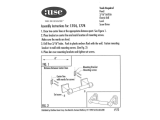
5
Installation Instructions
To remove front as shown (FIG.16)
1. Remove the two front retaining screws from the front frame.
2. Press firmly on each side of the metal case close to front, approximately 2/3 of the way down.
3. While pressing on the sides of the metal case, gently pull the front out and lift up to release it from the case.
4. Then release the electrical coupler plug.
Place air conditioner in window opening. As shown (FIG.17), it should sit on platform assembly so that
window panel frame and cabinet side channels are against top and side window jambs.
Outside edge is 3/16″
lower than inside.
Put platform
tab against
inside of track.
FIG.11A
Measure
distance
and
subtract
20-5/8″
FIG.12
Panel frame
Plastic
window panel
FIG.14
Apply side
channel seal
to side channels
just below edge
of panel frame
FIG.15
NOTE: DO NOT push or pull air direction louvers.
Front
Retaining
Screw
FIG.16
Slide inner
window sash
firmly against
cabinet.
FIG.17
Adjust platform assembly so that outside edge is 3/16″ lower than
inside edge, as shown (FIG.11A & FIG.B). This ensures proper water drainage
from the air conditioner.
Level platform assembly from side-to-side. Also, make sure window
track is level. Use leveling shims as necessary to ensure unit is level from
side-to-side.
Measure height of window opening from top of platform assembly as
shown (FIG.12). Subtract 20-5/8″. Mark this measurement on plastic window
panel, along the longer side.
Clamp plastic window panel between a board and a work table, and
cut along cutting line with a fine tooth saw. Remove any burrs with a file.
Fasten side channels to the sides of the air conditioner using 3 screws
(Item 17) per channel as shown (FIG.13). Start with first screw at top of
channel. Make sure hook ends of channels face toward back of unit.
Slide plastic window panel into panel frame as shown (FIG.14), with
the smooth side to the room. Slide panel frame assembly into side channels
of the AC cabinet. Make sure plastic window panel is firmly enclosed on all
sides by the retainer grooves.
10
11
12
13
14
15
Cut side channel seal into 2 equal lengths. Remove protective backing
and apply it to the rear side of cabinet side channels, starting just below panel
frame assembly (FIG.15). Pinch off excess length so seal is even with the bottom
of the cabinet side channel.
16
17
18
Place platform assembly, with platform tab against inside of window
track, and attach it to window jamb (FIG.11A). Use appropriate length
screws (Items 9-11 in preparing For Installation).
9
For Vinyl- Clad windows, place platform assembly, with platform tab
against insidh edge of the support bracket, and use two 3/8" screw (item 17)
to attach it to support bracket as shown (FIG.11B).
FIG.11B
Put platform tab
against inside edge
Outside edge is 3/16”
lower than inside.
Fastening
Side Channels
FIG.13










